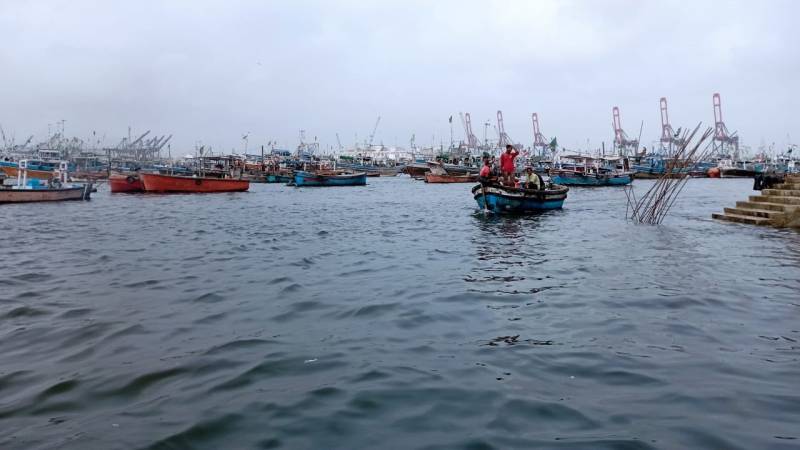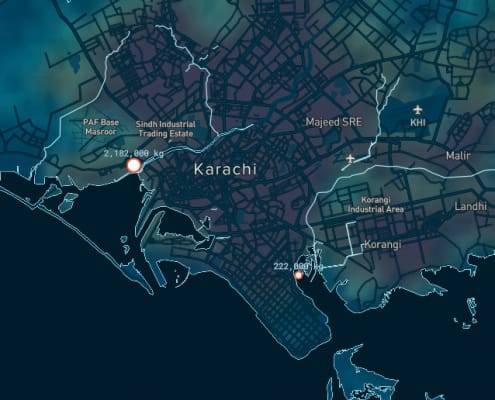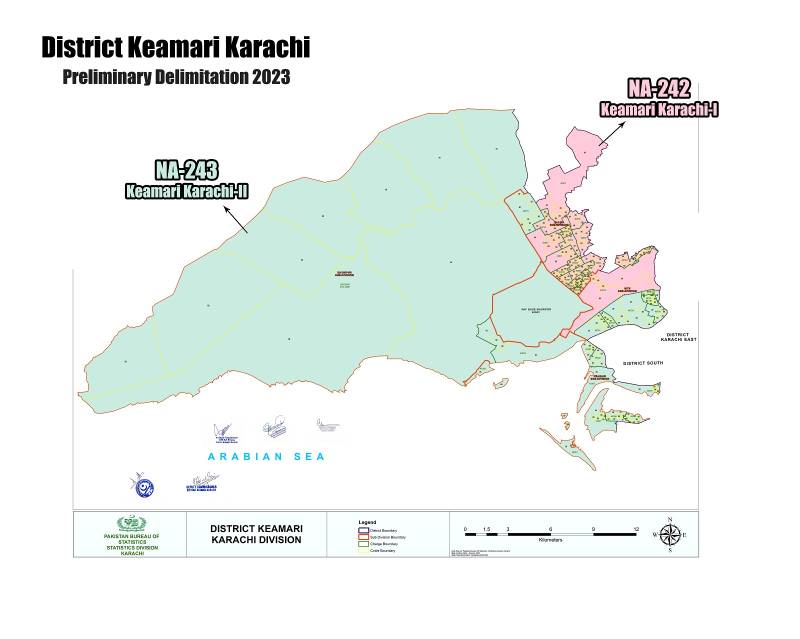
Naveed Bholla, a 41-year-old fisherman from an island on the coast of Karachi, spends his days and nights fishing in the deep sea. He is happy the general elections are taking place and is likely to vote.
The fisherman says he does not demand much from any candidate competing from his constituency, but a deciding factor in who he votes for could lie in who helps save his island and the sea from the deluge of plastic bags and pollution from the city.
Bholla lives on Baba Island, one of the many islands that dot Karachi's coastline with a resident population. It is located adjacent to Bhitt Island and the larger Manora Island — a naval cantonment town — at the mouth of Karachi's main harbour.
The islands are the last bit of land between the vast swathes of the Arabian Sea to the south; to the north lies the harbour, estuary to the Lyari River, the entire city of Karachi and the rest of Pakistan beyond it. The river has been dumping thousands of tonnes of trash and raw sewage into the small bay for years. Most trash washes ashore at Baba and Bhitt islands, with residents claiming that they are drowning in piles of polythene bags, single-use plastics and solid, untreated waste.
Drowning in a sea of garbage
This district holds significant environmental importance due to its location on the coastal strip, contributing to the vitality of aquatic life and ecological systems.
Around 20 years ago, Bholla says he used to go fishing in the sea within a four-kilometre radius around Baba Island. He adds that he used to be greeted with clear, sparkling waters that hosted various marine life. Their catch was bountiful and life was much better.
Bholla said he has since seen the sea become dirty and start to smell. The fish have been driven off and, with it, the livelihood of around 6,000 residents of the island.
The fisherman said they now have to travel for hours further along the coast or deeper into the sea to catch some fish. The trash and the pollution, though, are catching up with them in deeper waters, forcing them to go even further.
Urban planner Muhammad Towheed, who specialises in urban project management and administrative issues in Karachi, said that the coasts of Baba and Bhitt Shah Islands are full of garbage and solid waste.
This accumulation of waste, he explained, was due to the disorderly development of Karachi's population over the past two decades. This has resulted in the population living around natural drains of the city swelling, signified by the increase in the solid waste and plastic bags dumped into these drains.
Ocean pollution tracking organisation, called "The Ocean Clean Up", has released a map tracking plastic pollution in Karachi's major waterways. It tracks around 218,000 kilogrammes of plastic waste in the Lyari River and 222,000 kilogrammes through the Malir River as it enters the Arabian Sea daily. Another ten thousand tons of waste and effluents are dumped daily into the Lyari and Malir Rivers as they drain into the Arabian Sea.
The Sindh Solid Waste Management Board says some 70,000 tonnes of waste is present in Karachi's densely populated areas and waterways.

Towheed said that Karachi had three sewage treatment plants (TP-I, TP-II, and TP-III), which had a combined capacity to treat 150 million gallons of sewage per day (MGD). By 2005, their treatment capacity had reduced to approximately 50 MGD. By 2015, all three treatment plants had become inactive, and their treatment capacity had dwindled to zero.
Consequently, since 2015, more than 15 million citizens of Karachi have been discharging all of their raw sewage into the city's coastal waters.
Oil leaking from a tanker that ran aground, the Tasman Spirit, off the coast of Karachi in 2003 further damaged the coastal ecology.
Apart from the sewage, Towheed said effluents from the city's industrial areas are dumped into the different waterways, including the Malir and Lyari Rivers or directly into the Arabian Sea. From there, it combines with the massive floating garbage heap known as the Ocean Garbage Patch, further polluting the sea.
Environment and election promises
Baba Island is spread over an approximate area of 0.15 square kilometres, while Bhitt Island has an approximate area of 0.16 square kilometres. According to the 2023 census conducted by the Bureau of Statistics, about 6,600 people live on Baba Island, while about 5,400 people live on Bhitt Island. This puts their population densities at 44,000 and 33,750 persons per kilometre, respectively. The two islands are among the most densely populated islands in the world.
Most of the inhabitants of Baba Island belong to the Kuchi community, followed by Sindhis and Baloch.
The densely populated Baba and Bhit Islands share the NA-243 Karachi Keamari-II constituency with other coastal localities of Mauripur, Baldia and the industrial area of SITE. According to the Election Commission of Pakistan (ECP), there are 453,424 voters registered in NA-243-III Keamari. Among them, 261,913 are male voters (58%) and 191,511 are female voters (42%).

After the town system was abolished in 2011, the Keamari Town was reorganised as part of Karachi West District in 2015. In 2020, Keamari was separated from Karachi West District, effectively granting Keamari Town the status of a district.
Bohlla said that candidates primarily aligned with the Pakistan Peoples Party (PPP) for the past two decades have consistently won from this trinity of small islands.
While acknowledging the positive initiatives undertaken by the party, Bholla believes that the party should address the significant issue arising from the thousands of tonnes of plastic bags and containers washing ashore daily from Karachi's major drains. The trash also impacts the livelihoods of approximately 6,000 people on the island.
A decade ago, I used to earn enough money in a season or two to fulfil all my basic needs. Now, despite spending 15 to 20 days on a boat in the deep sea, I struggle to catch enough fish to economically sustain ourselves, Bholla said, adding that the fishermen were becoming weak — physically, economically and mentally.
Bholla's wife Kalsoom said that two months ago, she transferred her two sons and a daughter from the private school they were studying into a government school. This decision was made because her husband's income had shrunk so much that they could no longer afford the fees for the private school and two square meals a day.
For 53-year-old fisherman Nadeem Brohi from Baba Island, every fishing trip now involves fishing out plastic bags from the sea and collecting them in his boat.
"For me, it feels like I'm fighting a battle," Brohi said, adding every morning when he wakes up, he thinks about going to the sea to catch fish and earn money.
"When I get to the deep sea, my attention shifts from catching fish to collecting plastic bags from the sea," he said, adding, "I know it is not in my control, but I try to do my part."
Brohi said that a few days ago, a political candidate visited Baba Island, and he got to discuss various issues with him, including measures to stop waste from the city from reaching the islands.
"I was surprised to hear that despite being elected three times from this crucial district, he seemed completely unaware of why we were enduring such a sick and impoverished life," Brohi complained.
Echoing the sentiments of Bholla, Brohi said that despite the improvements made in many areas, access to clean drinking water on the island remains limited. While basic education is more accessible now than in the past, there does not appear to be any candidate who is prepared to address the issue of preserving the water and environmental systems of the islands.
Perhaps they do not grasp the significance of this issue, Brohi lamented.
Towheed said that any upcoming government must not only revive the old sewage treatment plants in the city but also consider installing two additional treatment plants at the Keamari Jetty to treat effluents pouring into the harbour area.
Only then can we work towards preserving the environmental well-being of our coastal islands to a significant extent, he said.
Mohammad Swalay, a resident of Baba Island and a climate activist, said that he had collaborated with various international organisations and had attempted to raise awareness amongst residents of the island about why it was important for them to collect plastic from the sea rather than wait for any authority to step forward.
He lamented that while the few residents of the island were prepared to take steps to protect their island from the devastation caused by effluents and solid waste being dumped into the sea, governments — both past and future — did not appear to be ready to do so.
Swalay claimed that no political party or candidate had a policy or section in their manifesto — including specific projects — that focused on protecting Baba and Bhitt Islands from contaminated water, dumped plastic bags, and solid waste.
Can elections save the islands?
In the 2018 general elections, former federal minister Abdul Qadir Patel of the PPP won from NA-243 by obtaining 35,124 votes. He was asked about his solutions to the problems faced by residents of Baba and Bhitt islands, which fall within their constituency.
"I understand that this area is crucial for environmental and marine life," Patel said, adding that he made every effort to address the issues his constituents face in the shortest possible time.
"The real challenge lies in formulating effective policies," Patel explained, adding, "Until we establish long-term policies, I believe we cannot ensure the protection of both the coastal residents and marine life."
Therefore, he said the PPP had devised a ten-point plan covering economic and environmental issues, particularly a long-term policy on environmental change and conservation.
Patel is again contesting from this constituency in the February 8 elections.
Sardar Abdul Aziz was a candidate for the Pakistan Tehreek-e-Insaf (PTI) in NA-243 during the 2018 general elections. He finished second behind Patel in the constituency with 34,101 votes.
"Environmental change is a significant issue equivalent to [the issue of] Pakistan's economy and has to be tackled by our efforts to reduce plastic usage," he said.
"Fundamentally, plastic is at the root of all these problems. However, the PTI manifesto already has a long-term project for environmental conservation," Aziz explained. Aziz is not contesting from NA-243 this year.
Swalay contested the claims made by the politicians, arguing that candidates from different political parties have never understood the intrinsic problem of tonnes of plastic waste being dumped into the sea every day.
Elections bring hope
For the residents of Baba and Bhitt islands, elections bring hope.
"Whoever is elected should be proactive in addressing coastal issues and find an immediate solution to this critical issue," they said.
"If we do not save our oceans in time, fishermen will be just as vulnerable to this calamity as the fish. Perhaps the sea itself will respond."

